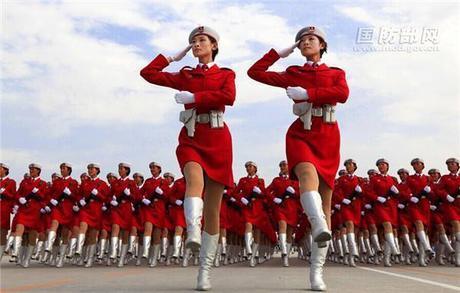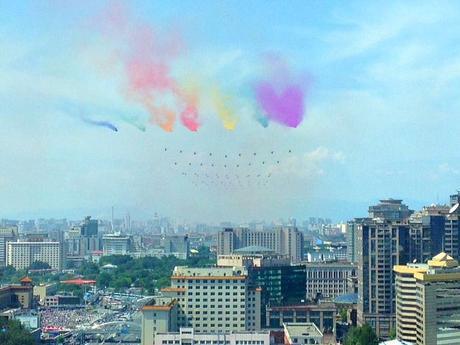
It was always going to be a display of grand proportions!
Beijing had been practicing for months in the lead up to V-Day Celebrations — the 70th anniversary of the end of WWII and victory over Japan.
China’s government had declared September 3rd a one-off public holiday. (In true China style, Friday and Saturday were also given as holidays, with a make-up day for the nation on Sunday!)
A grand military parade was to be held on Thursday – the first of such magnitude in a decade. 12,000 troops….rolling tanks, marching soldiers and aerial displays, the majestic order of the day.
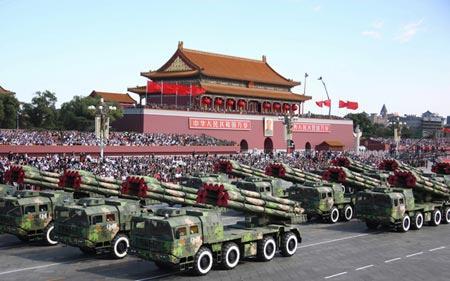
A monumental showcase of China’s military strength.
And believe you me, it didn’t disappoint.
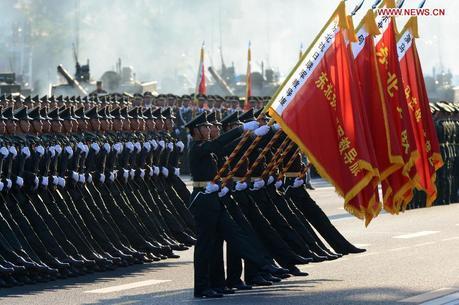
I was in two minds about whether this was the best time to visit Beijing for the very first time? We were told much of the city would be in lockdown for three days.
Our hotel was right in the heart of this event….a stone’s throw from the famous Tiananmen Square and Forbidden City.
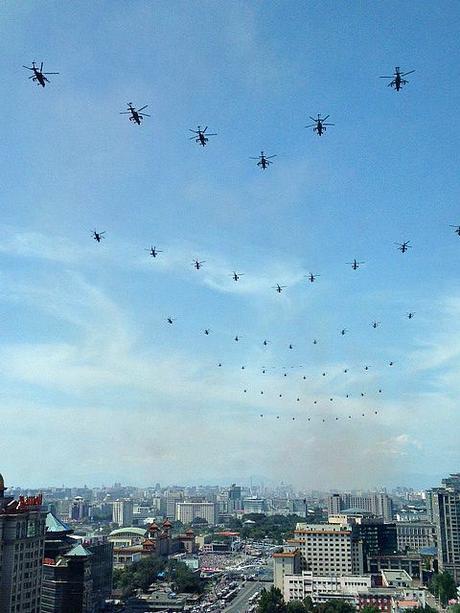
I was feeling a bit miffed I wouldn’t be able to stand on these sacred spots, but the journo in me was also a tiny bit excited to witness such a moment in China’s history.
In the 10 day lead up to the celebrations, a lot of things were banned in China.
On the naughty list – drones and any activities involving lightweight helicopters, gliders, hot-air balloons and aerostats.
VPN’s (much to my horror) were cracked down on, making internet connection increasingly difficult…
Beginning August 20, Beijing restricted the use of private vehicles on the city’s roads to every other day, based on even and odd numbered license plates.
And of course, companies in major polluting industries were suspended.
The airing of too many entertainment shows on local television was also discouraged, in favour of dramatic war-time heroics. A bid to rally the troops, so to speak and instill national pride. On the parade day itself, six of China’s CCTV channels were showing continuous footage of the parade.
Beijing’s two airports were shut for the parade.
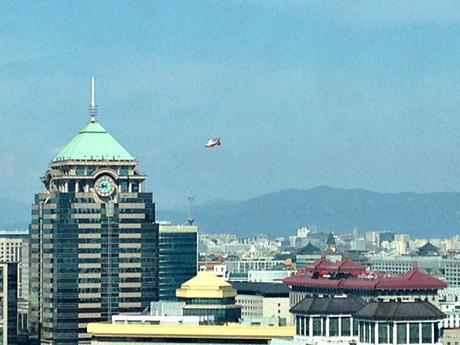
The skies an unusually brilliant shade of bright powder blue!! (A pollution-free Beijing is, it seems, possible if you know the right people!)
There were also 2.8 million flower pots….“featuring themes of peace and victory.”
Technically, the Chinese call it “The 70th anniversary of Chinese People’s Anti-Japanese War and the World Anti-Fascist War Victory Commemoration Day”
There’s no denying, since living on Chinese soil, I’ve noticed there’s a definite air of tension surrounding the Japan-China relationship.
(Lets not forget the shooting range half way up the mountain here in Xi’an.)
Not to mention word on the street.
China’s history books paint a story of a nation that has failed to acknowledge and apologize for wartime atrocities.
Even today much of the younger generations strongly believe there is a need for Japan to face up to its past.
Dr Su Hao from the China Foreign Affairs University said: “To the public, the parade is an important event that needs to be commemorated. So to them, I think that through the parade, it also shows pride in the nation and it rallies the people. So from this point of view, they understand and support the event.”
Other media described today as a deliberate message from President Xi Jinping that China is strong and has overcome past difficulties. President Xi Jinping declared, he’s presenting the People’s Liberation Army as a force for peace and regional stability.
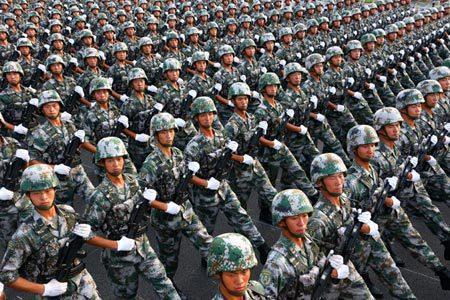
Diplomatic ties between the two historic foes Japan and have again been strained since late 2012 following a territorial dispute over uninhabited islands in the East China Sea.
The spat led to large-scale anti-Japan protests across China and the boycott of Japanese goods. I’m told if you were a local seen in a Japanese car…all hell would break loose. Consequently, sales of Japanese cars slumped by around 50 per cent.
Ironically though, with a few days off, many Chinese are heading up to Japan to go shopping! So perhaps still waters don’t run too deep, on the street at least.
In a speech to US Congress last month, Japanese Prime Minister Shinzo Abe expressed “deep repentance” over Japan’s role in World War II but stopped short of issuing his own apology.
This is the first such parade to be reviewed by China’s current President Xi Jinping…and it’s said, he was resolutely determined to execute it well.
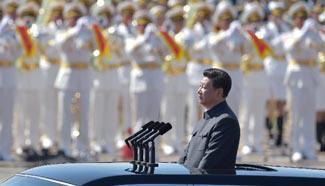
Many world leaders were invited to the spectacle…and many accepted the invitation, including Russian President Vladimir Putin, leaders from South Korea, Pakistan, Myanmar and Vietnam and former UK Prime Minister Tony Blair.
A number of Western leaders were conspicuous in their absence.
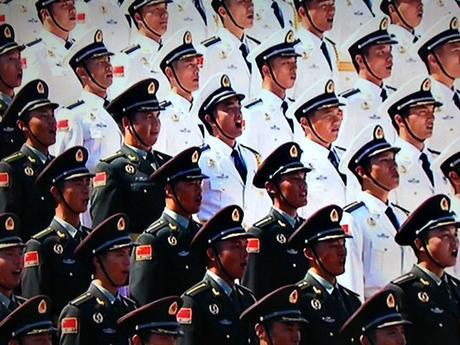
Thousands of troops from other countries were brought in – including soldiers from Mexico and Fiji..to march with China’s PLC. Beijing created four “military parade villages” – including one with a replica of Tiannanmen Gate — on the outskirts of the city, where the troops and military vehicles were deployed for parade rehearsals.
Remarkable to watch. An interesting time to be in Beijing.
An extravaganza!
This is China.
